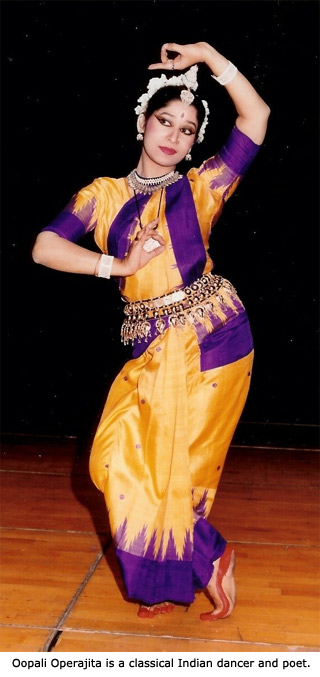Oopali Operajita will always feel connected to Pittsburgh and Carnegie Mellon, her home in America. It’s a city of “three mighty rivers and dozens of glistening bridges,” and a university that lifts her “like incense to the pewter marble expanse of the Great Hall at the College of Fine Arts.”

And it’s a place that inspired her poem, “Always Connect,” which she recently sent to Carnegie Mellon Today. Her poem, below, will appear in her first book of poetry, which will be published later this year.
Operajita of Bhubaneshwar, India, is a classical Indian dancer and poet who was a fellow at Carnegie Mellon’s STUDIO for Creative Inquiry during the late ‘80s and ‘90s. She frequently performed and lectured at dance exhibitions on campus, and she earned a master’s degree in professional writing from Carnegie Mellon in 1995. Her son, Ayus, is a sophomore in the College of Humanities and Social Sciences.
Operajita, who has been a political advisor and strategist for several prominent Indian leaders, says the poem’s title “Always Connect” is from English author and critic E.M. Forster’s “Howard’s End.”
“At the end . . . one of his memorable characters says, ‘Always connect the prose and the passion.’ I think that is a beautiful sentence to guide us through our lives,” she said.
Always Connect
You stand silent within the tangle
Of New Delhi’s voices.
On its streets, I think the spathodea trees
Have unleashed their tumultuous flame flowers
To welcome you.
In your presence, the jade and lapis
Of another city — and the inkteal
Of three mighty rivers, and dozens
Of glistening bridges — resonate in my eyes:
These are the colours of Pittsburgh,
My home in America.
I am lifted, like an incense
To the pewter marble expanse
Of the Great Hall
At the College of Fine Arts
In Carnegie Mellon University.
I hear the rustle breeze voices
Of young students
At the Alumni Concert Hall.
They ask me, incredulous,
If the text of my dance is really etched
In the Sun Temple of Konarak.*
When my lecture is over, they run onstage
And clasp my hands.
I can hear the goddess Saraswati’s** veena
Play in their eyes.
Nations, narratives,
The numinous arc of art engulfs all of us.
* The 13th c AD Sun Temple of Konarak in Orissa contains a comprehensive catalogue of reference of classical Odissi dance. Every significant pose and posture used by the contemporary Odissi dancer is etched on its walls.
** The goddess Saraswati, one of the major goddesses in the Hindu pantheon, is goddess of wisdom, knowledge and music.
Related Links:
STUDIO for Creative Inquiry



